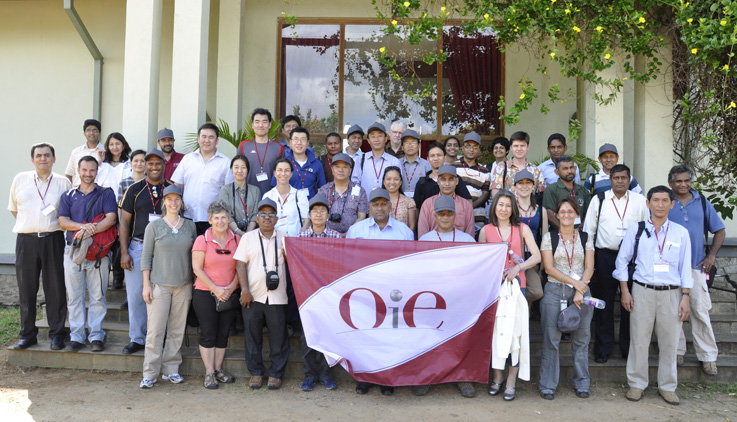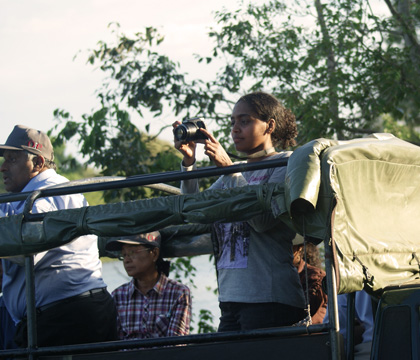Dr. Ted Leighton, a professor in the WCVM's Department of Veterinary Pathology and executive director of the CCWHC, attended the workshop along with graduate student, Dr. Asha Perera.
Hosted by the Sri Lanka Wildlife Health Centre, the Asia-Pacific Regional Training Workshop for OIE National Focal Points on Wildlife was delivered to participants from 40 countries in the Asia-Pacific Region of the World Organisation for Animal Health (also known as the OIE).
These participants, known as the National Focal Points for Wildlife, are charged with keeping track of wildlife disease issues in their country and helping their OIE delegates to correctly report the diseases internationally while managing them internally.
"The most important goal of the workshop was to empower all of these countries to do a better job of managing wildlife health issues," explains Leighton. "It gave them the basic principles of wildlife disease surveillance in a hands-on workshop format so they had real information to take home and use for planning what they can do in their own countries."

Perera, who will complete a Master of Science degree in the summer of 2012, presented sessions regarding targeted wildlife surveillance and wildlife diagnostics. Her expertise in those subject areas has been critical to her research investigating chronic wasting disease in mule deer of southern Saskatchewan.
A veterinary graduate of Sri Lanka's University of Peradeniya, Perera was particularly pleased to be involved and to have the opportunity to work with Leighton as well as Dr. Jonathan Sleeman, director of the United States National Wildlife Health Center – individuals who she considers to be giants in the wildlife health field.
"It was a highlight for me to participate as an instructor and facilitator, and it was especially important to be in my home country, meeting and working with professionals who are experts in wildlife health issues in Sri Lanka and the Asia-Pacific region."
Perera's short visit home also gave her a chance to enjoy the familiar wildlife of her country. In addition to presentations regarding the OIE's functions and structure, the three-day agenda included a trip to Uda-Walawe National Park and its Elephant Transit Home. This centre takes in and raises orphaned baby elephants and has been remarkably successful at reintegrating them back into the wild.
As an OIE designated collaborating centre for wildlife disease monitoring, surveillance, epidemiology and management, the CCWHC is charged with helping other countries to gain expertise through workshops such as this one. Designed by Leighton as well as Dr. Jane Parmley (WCVM '98) of the CCWHC (University of Guelph), this particular curriculum has now been taught in each of the five OIE regions of the globe.
The workshop is designed so that participants work in groups – an excellent networking opportunity for them – while they engage in table-top exercises designed to help them absorb new information in a practical and useable way.
"A very positive feature of the workshop is that it has helped to establish a community of practice and a network of communications," says Leighton. "The people in the region who are responsible for knowing about wildlife have had the opportunity to work together and develop relationships that will continue over the years."
Hosted by the Sri Lanka Wildlife Health Centre, the Asia-Pacific Regional Training Workshop for OIE National Focal Points on Wildlife was delivered to participants from 40 countries in the Asia-Pacific Region of the World Organisation for Animal Health (also known as the OIE).
These participants, known as the National Focal Points for Wildlife, are charged with keeping track of wildlife disease issues in their country and helping their OIE delegates to correctly report the diseases internationally while managing them internally.
"The most important goal of the workshop was to empower all of these countries to do a better job of managing wildlife health issues," explains Leighton. "It gave them the basic principles of wildlife disease surveillance in a hands-on workshop format so they had real information to take home and use for planning what they can do in their own countries."

Perera, who will complete a Master of Science degree in the summer of 2012, presented sessions regarding targeted wildlife surveillance and wildlife diagnostics. Her expertise in those subject areas has been critical to her research investigating chronic wasting disease in mule deer of southern Saskatchewan.
A veterinary graduate of Sri Lanka's University of Peradeniya, Perera was particularly pleased to be involved and to have the opportunity to work with Leighton as well as Dr. Jonathan Sleeman, director of the United States National Wildlife Health Center – individuals who she considers to be giants in the wildlife health field.
"It was a highlight for me to participate as an instructor and facilitator, and it was especially important to be in my home country, meeting and working with professionals who are experts in wildlife health issues in Sri Lanka and the Asia-Pacific region."
Perera's short visit home also gave her a chance to enjoy the familiar wildlife of her country. In addition to presentations regarding the OIE's functions and structure, the three-day agenda included a trip to Uda-Walawe National Park and its Elephant Transit Home. This centre takes in and raises orphaned baby elephants and has been remarkably successful at reintegrating them back into the wild.
As an OIE designated collaborating centre for wildlife disease monitoring, surveillance, epidemiology and management, the CCWHC is charged with helping other countries to gain expertise through workshops such as this one. Designed by Leighton as well as Dr. Jane Parmley (WCVM '98) of the CCWHC (University of Guelph), this particular curriculum has now been taught in each of the five OIE regions of the globe.
The workshop is designed so that participants work in groups – an excellent networking opportunity for them – while they engage in table-top exercises designed to help them absorb new information in a practical and useable way.
"A very positive feature of the workshop is that it has helped to establish a community of practice and a network of communications," says Leighton. "The people in the region who are responsible for knowing about wildlife have had the opportunity to work together and develop relationships that will continue over the years."
Share this story
